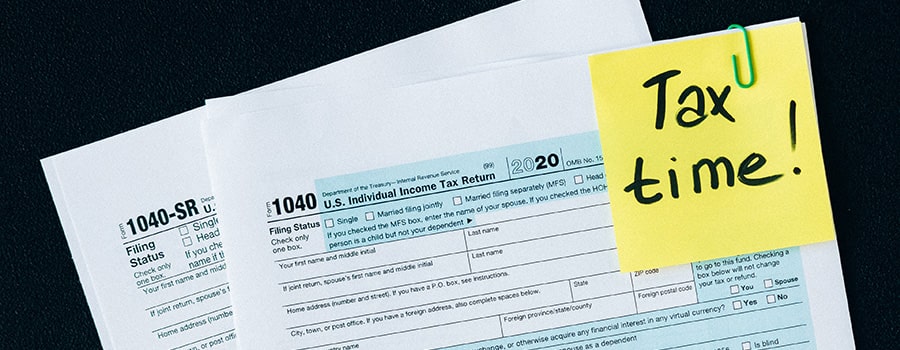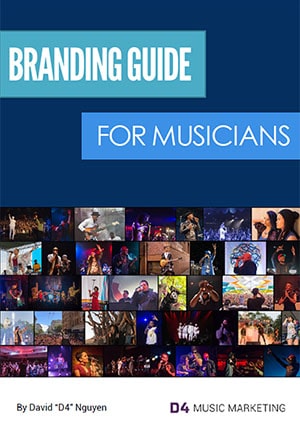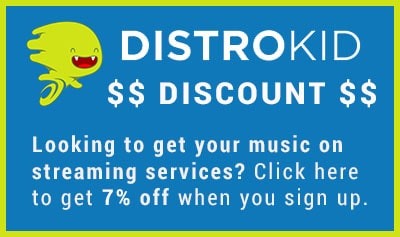
Please Note: I am not a financial advisor or tax consultant. The contents of this blog is for educational purposes only. Nothing contained here is financial, legal, tax or accounting advice. Be sure to talk with a professional tax consultant or accountant if you’re unsure about filing taxes as a musician. The information contained is specifically for those who live and work in the United States.
Have you started bringing in income from music and you’re unsure of how to prepare for taxes?
Being able to earn money as a musician is the first key step from something just being a hobby to becoming a full-time professional. Unfortunately, this is also where income taxes kick in and things can get complicated quickly.
In this blog, which is part 2 of my beginners guide for filing taxes, I’ll cover 5 fundamental tips on how independent artists should get started with accounting for their music business. Also, I share a list of expenses you may be able to write-off as a musician.
1. Establish an accounting system
First things first. You need an accounting system to stay organized throughout the year. The last thing you want to do is to stress about getting everything together last minute and trying to remember things that already happened several months ago. Once you have a system set up, you’ll need to get into the habit of keeping records as things happen or within the next few days. Most of the time, it should only take a minute.
To create your own accounting system, start a spreadsheet for all your music business transactions using your favorite software. It could be Google’s Sheets (Free), Microsoft’s Excel (Free Web Version) or Apple’s Numbers (Free).
You can create a separate spreadsheet file for each filing year and use the tabs within the spreadsheet to track your income, expenses, driving mileage, estimated tax payments, etc.
Or you can use each tab for each filing year and create a layout that allows you input everything you need to track all in one tab. This is what I like to do personally as it allows me to easily use basic sum functions to easily calculate total income, expenses and net income.
For each itemized transaction, record the date, what it is, how much and where you can find the record of that transaction.
If you already have a tax advisor or accountant who files your taxes for your day job employment, you should consult with them about how they would want you to track everything.
Another option is you can pay for bookkeeping or sign up for accounting software, like FreshBooks, to help track and organize all of this for you.
I personally don’t use any to save money and I find I’m able to do everything I need to track and stay organized with my own spreadsheets. However, when I’m ready, I would use and recommend FreshBooks (Affiliate Link Disclosure). They offer a free 30 day trial without the need of a credit card too!
2. Save your business receipts and invoices
It’s good practice to keep all your business related receipts and invoices, physically and/or digitally. Basically, any documentation related to your music business, which includes 1099 forms you may receive. According to the IRS, you’ll want to hold to all of these things for 3 to 6 years just in case.
Personally, I store all my physical receipts in an envelope with the year on it. For expenses or purchases online, I’ll screenshot the receipt or download the PDF version and store it in a DropBox folder labeled with the year.
In accounting software like FreshBooks, you can take photos of receipts and have it conveniently stored all on your account.
In case you ever get audited by the IRS, you’ll be able to show all the proper documentation that support your numbers.
3. Track All Taxable Income Sources
For any music-related income you’ve earned within the year, you’ll want to track in your spreadsheets or accounting software and report in your tax returns. This includes things like:
- Live performance
- Music royalties
- Merch sales
- Music production
- Session musician gigs (Work for hire)
- Brand deals
- Music education / lessons
Check out my blog on music income sources for more details.
When tracking individual income payments in your spreadsheet, you’ll want to have:
- Who paid you
- Date of payment
- How much you were paid
- What method was used (cash, check, Venmo, Zelle, PayPal, etc.)
Keep in mind that the income you report to the IRS for the tax year needs to be received within that year and does not count money still owed or pending.
For Example: If you perform a live gig at a local bar on December 28th, 2022 for $500, but you don’t receive and deposit that check until January 4th, 2023, then that income is reported in the filing year of 2023 and not 2022 when the service was performed.
4. Know What Expenses Are Write-Offs
In order to retain as much of your hard earned money, you’ll want to take advantage of deducting any business-related expenses to reduce the amount of taxable income. This is why it’s important to track all of these things either in an accounting app or a personal spreadsheet.
For each item you record in your spreadsheet, you’ll want to have:
- Who you paid
- Brief description of how it relates to your business
- Date you paid
- The amount you paid
- What method was used (cash, check, Venmo, Zelle, PayPal, etc.)
It would be best to group and track certain expenses separately rather than one general list of expenses. For example, you can group the different expenses with the categories below.
The following list is not meant to be an exhaustive list of everything you can deduct, but a general idea of what you should be tracking as an expense. Just be aware that not all expense write-offs are treated the same way. Some types of expenses have different rules and requirements that may change over time so it’s important to consult with a tax professional or accountant.
Equipment / Gear
- Musical instruments
- Instrument repairs / upkeep
- Computers / Laptops
- Home studio equipment (Mics, headphones, soundproofing)
- Live performance gear (PAs, mics, lighting, live mixing boards)
- Office equipment (Printers, scanners)
- Cameras
Writing off equipment costs can be a bit more tricky. Unlike some of the other types of business expenses, you have more options of how equipment is deducted from your tax return.
You can write-off the entire cost of the equipment in the first year of use or you have the option of deducting a percentage of the cost over several years, known as depreciation. The IRS understands that expensive business assets, like musical instruments, can lose value over time or depreciate from use.
For new musical instruments, the IRS says they are depreciated over 7 years. If you bought a new laptop to record and produce music, that would be depreciated over 5 years.
There are also different methods of how you depreciate an asset in your tax returns over a period of years. Although you have the option of how to deduct costs, depreciation is typically used for more expensive, longer term assets that cost over $2,500. Otherwise, it may just make more sense to write off the entire cost in the year of purchase.
Office / Supplies
- Work computer
- Furniture (Desk, computer chair, lamps, file cabinets)
- Business cards
- Business licenses
- Insurance
- Office supplies
- Printer (Paper, ink)
- Dedicated office space (Rent, utilities)
- P.O. Box
This section is about office or work space related expenses. If you have a dedicated space in your home for an office or studio, there are some things you can write off a percentage of:
- Internet service
- Rent
- Utilities (electricity, water, phone)
- Homeowner expenses
- Cell phone service
Generally what you can write-off is based on the percentage that you use something for business versus what is for personal use.
Also, in order to deduct things like rent and utilities as a home office expense, the space needs to be exclusively and regularly used for work or a separate structure on the property.
In other words, your bedroom can’t be a home office even if you have your recording studio setup in there. It needs to be its own separate room that is used exclusively for that business purpose.
If you do have a dedicated office or studio in your home, you’ll need to come up with what percentage of your home is exclusively used for business purposes.
To calculate this, measure the square footage of the room that you use exclusively for business. Divide the square footage of the room with the square footage of the entire home and that will give you the percentage you need for your tax return.
Office Square Footage: 200
Home Square Footage: 1,000
200 / 1,000 = 20%
This is an area that has a lot of nuances so you’ll definitely want to consult with a tax professional to clarify.
Software / Subscriptions / Online Marketing
- Digital Audio Workstations (Ableton Live, FL Studio, Logic Pro, Pro Tools)
- Music distribution (DistroKid, CD Baby)
- Business / Office software (Microsoft Office)
- Online cloud storage (Dropbox, Google Drive)
- Graphic design and photography software (Canva, Adobe Photoshop)
- Video editing software (Adobe Premiere)
- Social media tools
- Domain name registration / hosting
- Website hosting
- Website backup services
- Advertising (Facebook Ads, Instagram IDs, YouTube Ads, Spotify Ads)
- Legitimate playlisting services
- Email marketing tools (MailChimp)
- Accounting / Bookkeeping software (Freshbooks, Quickbooks)
- Project management software (Slack, Monday)
Work-Related Travel / Touring
If you travel and tour as a part of your music business, all related expenses can be deducted.
- Music industry events / conferences (CD Baby’s DIY Musician Conference)
- Trade Shows (NAMM)
- Tour bus rental and driver
- Transportation expenses (Rental car, flights, trains, rideshare apps, taxi, subway)
- Lodging (Hotels, motels, Holiday Inn, AirBnb)
- Food while on tour
- Business meals (50% deductible)
- Shared entertainment with other industry professionals
- Vehicle expenses*
- Parking*
- Toll*
- Car insurance*
- Gas*
* If you drive your own vehicle for business-related travel, you have 2 options for writing off these expenses.
Actual Expenses: Total up all the vehicle-related costs for the year (like insurance, gas, repairs, registration fees, etc.) and then figure out what percentage of the vehicle was used specifically for business use.
Standard Mileage Rate: Instead of deducting the total vehicle expenses for business use, you can just track the number of business miles traveled and multiply that with a flat rate the IRS determines each year. For example, if you’ve traveled 10,000 business-related miles with your vehicle and the standard mileage rate for the tax year is 60 cents a mile, then you can write off $6,000.
You can track mileage, to and from, for things like going to:
- Office
- Music lessons
- Recording studio
- Business meetings / meals
- Business-related event
- Tour / shows
- Creating content (music video, photoshoot)
Standard mileage rate is usually the easiest and better option for most people. You can choose whichever option offers you a higher deduction each year so be sure to track all vehicle-related expenses and business miles in your spreadsheet or accounting system.
It’s also a good idea to record your odometer reading for your vehicle on January 1st to be able to calculate the total number of miles driven the prior year. If you’re tracking all business miles separately, as you should, then you’ll be able to determine what percentage of the vehicle is used for personal use or business. (Business miles / Total miles driven)
Professional Services
- Business manager
- Bookkeeper
- Accountant
- Photographer
- Graphic designer
- Booking agents
- Artist commissions (Album cover, merch design)
- Videographer
- Attorney
- Tour manager
- Publicist
- Assistant
- Mixing & mastering engineer
- Session musician
- Royalty accounting
- Tax professional
Part of growing as an artist is building a team around you to help you focus more on the creative aspects of your business. Throughout this journey, you’ll be hiring professional services in all different areas of business that you can write-off.
Merch-Related
- E-commerce website
- Merchandise production costs (shirts, hats, posters, stickers)
- Vinyl, CD pressing costs
- Table and display
- Merch table seller
- Shipping costs (USPS, UPS)
- Shipping envelopes and boxes
- Fulfillment services
- Warehouse storage
- Square Up Card Reader
- Cash box
- Storage containers
- Sharpies (For signing)
Selling merch is usually a top income source for a full-time musician. There are a lot of expenses that can be deducted in this area. Just keep in mind that deducting the cost of merch is done by filling out the ‘Cost of Goods Sold’ section on your Schedule C. This is assuming you are a sole proprietor or a single-owner of a LLC.
Basically, ‘Cost of Goods Sold’ means you can only deduct the costs that went into making the products you actually sold that year.
To keep it simple, let’s say you pressed up $1,000 worth of CDs in 2022. By the end of the year, you sold half so the ‘Cost of Goods Sold’ is $500, which is how much you can deduct.
The remaining $500 in CDs is your ‘Ending Inventory’ and that would also be the ‘Beginning Inventory’ for the next filing year.
Music Recording / Production
- Recording studio time
- Recording software
- Producer fees
- Sound engineer
- Mixing engineer
- Mastering engineer
- Studio musicians
- Rental equipment
- Rehearsal space
- Music libraries
- Plug-ins
Live Music Production
- Live sound engineer
- Lighting engineer
- Roadies
- Security
- Rental equipment
- Costumes/stage props
- Live musicians
- Practice / rehearsal space
- Promotional materials (Flyers, posters)
Music Membership / Organizations / Associations
- PRO Fees (ASCAP, BMI)
- Music organization membership fees (Grammy Recording Academy)
- Business organization membership fees
- Publishing Administration
- SoundExchange
Education / Training / Research
- Music lessons and coaching
- Music classes
- Music related books, trade publications and magazines
- Performance training
- Dance lessons
- Online training sites (like Lynda, Masterclass, and Skillshare)
Financial and Platform Fees
- Bank charges
- Credit card fees
- Financial fees
- Payment processing fees (PayPal, Stripe, Square Up)
- Platform fees (Bandcamp, Patreon)
The different fees related to your bank, payment processing and even online platforms can be treated as an expense.
Other Miscellaneous Items
- Self-employment health insurance
- Charity donations
- Retirement Plan (Roth IRA or Traditional IRA)
5. Set something aside for estimated taxes.
Similar to how an employer would withhold a percentage of your paycheck, you want to get into the habit of setting money aside each month to pay your quarterly estimated taxes on time. You can deposit this money into a separate bank account or you can just pay the IRS directly each month. Even though estimated taxes are due quarterly, it doesn’t mean you can’t pay them earlier. There are penalties involved if you don’t pay on time or if you underpay.
How much you put aside will depend on what you’re expected to pay in taxes for the upcoming tax year. If you filed the previous year, it would be reasonable to expect you’ll pay roughly the same amount, hopefully more, the following year. If that’s the case, divide what you owed the previous year and divide by 12 to give you an idea of what you may want to save each month.
Conclusion
Making the decision to become a full-time musician shouldn’t be mentally “taxing” so hopefully this helps you build the proper foundation for tracking everything you need to file taxes as a musician. Create that accounting system early and build the habit of logging in all your business transactions as soon as possible so you don’t end up forgetting the details!
As your career grows, you can eventually pay up for accounting software like Freshbooks (and yes, that cost is a write-off!) or hire a bookkeeper to help. However, it’s still good to continue these habits so you can be less stressed when tax season rolls around. The last thing you want is to lose out on your hard earned money or even worse, get audited by the IRS.
If you haven’t already, check out the first part of the beginners guide for filing taxes as an independent artist. I covered common questions new musicians pursuing music professionally may have regarding taxes.







